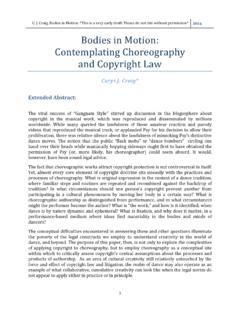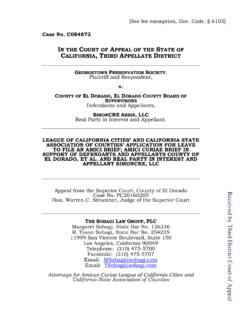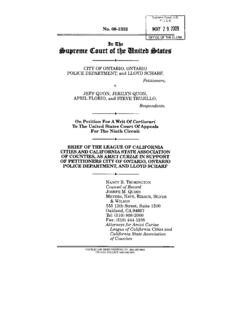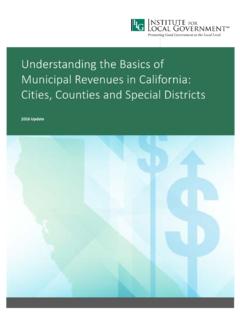Transcription of Manuela Albuquerque - Berkeley Law
1 OAK #4850-2503-9122 v1 PRESENTED BY THE MUNICIPAL LAW INSTITUTE OF THE league OF california cities AND THE california CONSTITUTION CENTER OF UC Berkeley SCHOOL OF LAW FEBRUARY 8, 2013 CONSITUTIONAL POWER OF CITIESM anuela AlbuquerqueDirector, Complex Public Litigation & Projects, Burke Williams & Sorensen,1901 Harrison Street, Oakland Ca. 94601, Tel. , Fax: #4850-2503-9122 v12I. INTRODUCTIONIn california , the powers of the cities are set forth, in the main, in two constitutional provisions: Article 11, section 7, which describes the power of all cities , and Article 11, section 5, which embodies the principle that cities created pursuant to a charter have the ability to override general state laws with which they conflict as to any subject which can be classified as a municipal NATURE OF cities NOT SUBDIVISIONS OF THE STATEC alifornia cities are instruments of local government unlike counties which are deemed subdivisions of the state.
2 (Abbott v. Los Angeles (1958) 50 438, 467[ A county is a governmental agency or political subdivision of the state, organized for purposes of exercising some functions of the state government, whereas a municipal corporation is an incorporation of the inhabitants of a specified region for purposes of local government. ]. (citation omitted.)2 In contrast with Article XI section 1, which deals with counties, Article XI section 2 does not describe cities as subdivisions of the State. It merely provides that the Legislature shall prescribe uniform procedure for city formation and provide for city powers. III. GENERAL POWERSOnce formed, general law cities have authority to structure and manage their own affairs. For example, general law cities have the authority to decide whether they will adopt a city manager form of government and whether they will have an elective mayor.)
3 (Gov. Code 34800 and 34900.) They also have wide latitude in deciding what municipal services they will provide3 or services they need (See alsoMyers v. City of Calipatria(1934) 140 295, 298 [ It was discretionary with the city council whether the office of city attorney should be filled or not. ].) 1 CAL. CONST. art. 11, 5, The State is divided into counties which are legal subdivisions of the State. (Cal. Const. 1 (a).)The county is merely a political subdivision of state government, exercising only the powers of the state, granted by the state, created for the purpose of advancing the policy of the state at large .. (County of Marin v. Superior Court(1960) 53 633, 638, 2 758, 349 526; accord Pacific Gas & Electric Co.)
4 V. County of Stanislaus (1997) 16 1143, 1158).3 For example, cities may establish libraries, museums and hospitals, but are not required to do so (Gov. Code 37542 and 37601; Educ. Code 18900), they may spend money on music or promotion, but are not required to do so (Gov. Code 37110), they may contribute to nonprofit educational radio or television stations, but are not required to do so (Gov. Code ); and they may use public funds to remove graffiti but are not required to do so (Gov. Code 53069).OAK #4850-2503-9122 v13 General law cities also have broad power to decide the instrumentalities by which municipal services will be provided. There is no statutory requirement that a general law city hire any employees at all or that it appoint any city officers whatsoever, with the possible exceptions of the police and fire chiefs.
5 Government Code section 36505 provides: The City Council shall appoint the chief of police. It may appoint a city attorney, superintendent of streets, a civil engineer, and such other subordinate officers or employees as it deems necessary. (emphasis added.)There is likewise no requirement that a city establish a civil service systems but it has the authority to do so:It is the intent of this chapter to enable the legislative body of any city to adopt such a personnel system, merit system, or civil service system as is adaptable to the size and type of the city. The system may consist of the mere establishment of minimum standards of employment and qualifications for the various classes of employment, or of a comprehensive civil service system, as the legislative body determines for the best interests of the public service.
6 (Gov t Code 45000.)A city has the implied powers to carry out its purposes: In general, powers given to municipal corporations include the further power to employ such modes of procedure as are appropriate and necessary for their effective exercise. (Ravettino v. San Diego (1945) 70 Cal. App. 2d 37, 47.) This inherent power is also reiterated in Government Code section 37112 which provides: In addition to other powers, a legislative body may perform all acts necessary or proper to carry out the provisions of this title. 4 Municipal powers include the power to contract to accomplish municipal functions: [A] city has authority to enter into contracts which enable it to carry out its necessary functions, and this applies to powers expressly conferred upon a municipality and to powers implied by necessity.
7 [Citation.] (Morrison Homes Corp. v. City of Pleasanton (1976) 58 724, 734.) 4 Title 4 of the Government Code concerns Government of cities . OAK #4850-2503-9122 v14IV. ARTICLE X1 SECTION 7 GRANTS ALL cities BROAD POWERSThe key defining constitutional provision is Article XI, section 7. It provides in pertinent part as follows: A county or city may make and enforce within its limits all local police, sanitary and other ordinances and regulations not in conflict with general laws. Moreover, the constitutional grant of power cannot be denied by the state legislature merely by enacting a law which prohibits the city from acting without any affirmative act of the legislature occupying the field. Such denial would violate the express authority granted by the constitution to the municipality to enact local regulations.
8 The california Supreme Court stated the principle thus: In other words, an act by the legislature in general terms that the local legislative body would have no power to enact local, police, sanitary or other regulations, while in a sense a general law, would have for its effective purpose the nullification of the constitutional grant, and, therefore, be invalid. Thus, while article 11, section 7 is referred to continually as the source of cities police power, its explicit terms contain no such limitations, and in fact authorize the enactment of all police, sanitary or other ordinances and regulationsArticle XI, section 7 of the california Constitution grants a city broad discretionary power to make and enforce within its limits all local police, sanitary, and other ordinances and regulations not in conflict with general laws.
9 (See also Gov. Code 37100 [ The legislative body [of a city] may pass ordinances not in conflict with the Constitution and laws of the State or United States. ].) At all times since adoption of the Constitution in 1879, section 11 of article XI has specified that Any county, city, town, or township may make and enforce within its limits all such local, police, sanitary, and other regulations as are not in conflict with general laws. (Bishop v. City of San Jose (1969) 1 56, 61.) [L]ocal governments (whether chartered or not) do not lack the power, nor are they forbidden by the Constitution, to legislate upon matters which are not of a local nature, nor is the Legislature forbidden to legislate with respect to the local municipal affairs of a home rule municipality.
10 Instead, in the event of conflict between the regulations of state and of local governments, or if the state legislation discloses an intent to preempt the field to the exclusion of local regulation, the question becomes one of predominance or superiority as between general state laws on the one hand and the local regulations on the other. (Id. at p. 62.) The police power granted by the Constitution is the power of local governments to legislate for the general welfare. (Pleasant Hill Bayshore Disposal, Inc. v. Chip-It OAK #4850-2503-9122 v15 Recycling, Inc. (2001) 91 678, 689.) The police power is considered so important that it is deemed an inherent attribute of political sovereignty. (Id at p. 690.) cities have broad powers. (Sunset Amusement Co. v. Board of Police Comm rs (1982) 7 64, 72.)



















